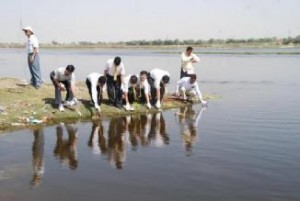Industrial and other Manmade Disasters
Sanitation during wars and emergencies
Posted on 20 Nov, 2009 09:03 PMDuring conflicts and wars, many die as a consequence of bombings and battles. To the death toll, many more zeroes get added in the days and months to follow! Poor hygiene and sanitation takes several hundred lives in the refugee settlements.
Greenhouse gases and where they come from: A low down on the GHG scenario across the world
Posted on 25 Aug, 2009 11:23 AMIn the debate over global warming, many a time, there is an attempt to indicate that human contribution to the Greenhouse effect is on a very minuscule scale and is negligible when compared to the scale at which GHGs as a whole work.
Paper and pulp mills pollute Uttarakhand hills
Posted on 20 Aug, 2009 04:49 PMVillagers and townsfolk of Lalkuan, Bindukhatta, Pantnagar, Kichha, Bazpur and Kashipur in Uttaranchal's terai belt are beset by water and air pollution, and have picked up a struggle against a number of red-category (most polluting) paper and pulp units and distilleries in the districts of Nainital, Udham Singh Nagar and Hardwar, which are polluting the Uttarakhand hills with impunity.
Poverty eradication by Neeru-Meeru, an initiative undertaken by government of Andhra Pradesh
Posted on 19 May, 2009 05:55 PMThis report by the Panchayati Raj and Rural Development Department, Government of Andhra Pradesh, provides information on Neeru Meeru, a water conservation and poverty alleviation inititaive undertaken by the governemnt of Andhra Pradesh.
Agra: Yamuna river trash cleanup 2009
Posted on 23 Apr, 2009 11:45 AMAhead of the Lok Sabha polls, hundreds of students of several schools along with senior citizens cleaned up Poiya Ghat Sunday morning, picking up rags and used polythene bags, to focus attention on river pollution which candidates of various political parties have chosen to ignore.
Brij Khandelwal, programme convener of the Yamuna Foundation and Rivers of the World Foundation, said apart from students involved in the My Clean Agra initiative, a large number of other voluntary groups and organisations were involved in Sunday's programme which specifically targeted the politicians for failing to clean up the cities and the rivers of India.
"No political party has bothered to say a word about how they would save a dying river and rejuvenate it or restore its original glory," said Subhash Jha and Haridutt Sharma of the Yamuna Foundation for Blue Water.






